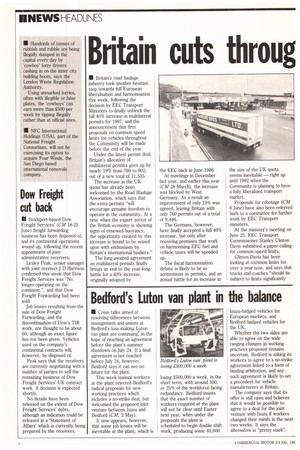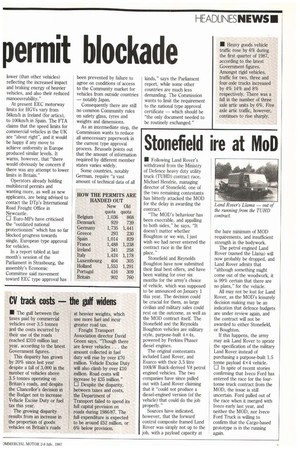Britain cuts throug permit blockade
Page 6

Page 7

If you've noticed an error in this article please click here to report it so we can fix it.
• Britain's road haulage industry took another hesitant step towards full European liberalisation and harmonisation this week, following the decision by EEC Transport Ministers to finally unblock the full 40% increase in multilateral permits for 1987, and the announcement that firm proposals on common speed limits for vehicles throughout the Community will be made before the end of the year.
Under the latest permit deal, Britain's allocation of multilateral permits goes up by nearly 19% from 760 to 902, out of a new total of 11,535.
The increase in the UK quota has already been welcomed by the Road Haulage Association, which says that the extra permits "will encourage genuine freedom to operate in the community. At a time when the export sector of the British economy is showing signs of renewed buoyancy, the opportunity created by this increase is bound to be seized upon with enthusiasm by Britain's international hauliers."
The long-awaited agreement on multilateral permits finally brings an end to the year-long battle for a 40% increase, originally adopted by the EEC back in June 1986.
At meetings in December last year, and earlier this year (CM 28 March), the increase was blocked by West Germany. As a result an improvement of only 15% was agreed, leaving Britain with only 760 permits out of a total of 9,446.
The Germans, however, have finally accepted a full 40% increase, but only after receiving promises that work on harmonising EEC fuel and vehicle taxes will be speeded up.
The fiscal harmonisation debate is likely to be as acrimonious as permits, and an annual battle for an increase in the size of the UK quota seems inevitable — right up until 1992 when the Community is planning to have a fully liberalised transport market.
Proposals for cabotage (CM 6 June) have also been referred back to a committee for further work by EEC Transport ministers.
At the minister's meeting on June 25, EEC Transport Commissioner Stanley Clinton Davis submitted a paper calling for common speed limits.
Clinton Davis has been looking at common limits for over a year now, and says that trucks and coaches "should be subject to limits significantly lower (than other vehicles) reflecting the increased impact and braking energy of heavier vehicles, and also their reduced manoeuvrability."
At present EEC motorway limits for HGVs vary from 561uniii in Ireland (for artics), to 100krn/h in Spain. The FTA claims that the speed limits for commercial vehicles in the UK are "about right", and it would be happy if any move to achieve uniformity in Europe produced similar levels. It warns, however, that "there would obviously be concern if there was any attempt to lower limits in Britain."
Operators already holding multilateral permits and wanting more, as well as new applicants, are being advised to contact the Dip's International Road Freight Office in Newcastle.
0 Euro-MPs have criticised the "outdated national protectionism" which has so far blocked progress towards single, European type approval for vehicles.
In a report tabled at last month's session of the Parliament in Strasbourg, the assembly's Economic Committee said movement toward EEC type approval has been prevented by failure to agree on conditions of access to the Community market for vehicles from outside countries — notably Japan.
Consequently there are still no common Community rules on safety glass, tyres and weights and dimensions.
As an intermediate step, the Commission wants to reduce all unnecessary paperwork in the current type approval process. Brussels points out that the amount of information required by different member states varies widely.
Some countries, notably German, require "a vast amount of technical data of all kinds," says the Parliament report, while some other countries are much less demanding. The Commission wants to limit the requirement to the national type approval certificate — which should be "the only document needed to be routinely exchanged."




















































































